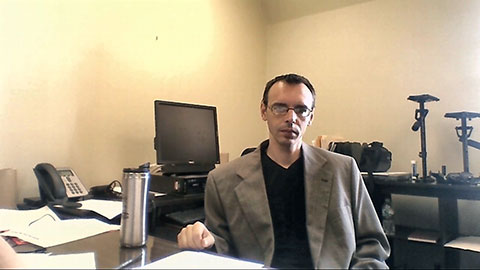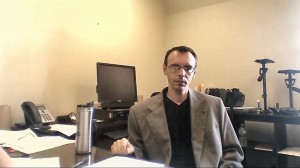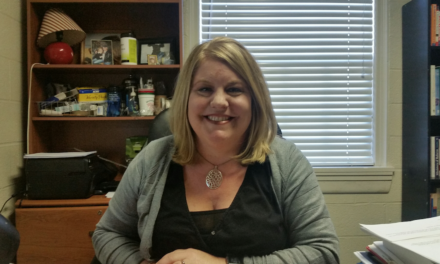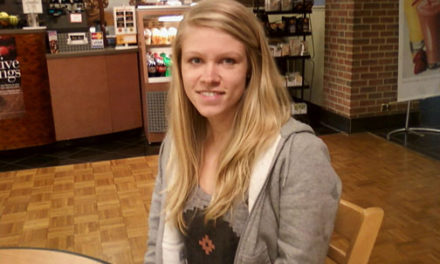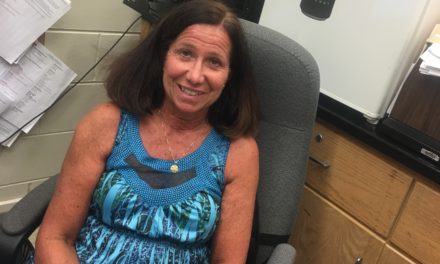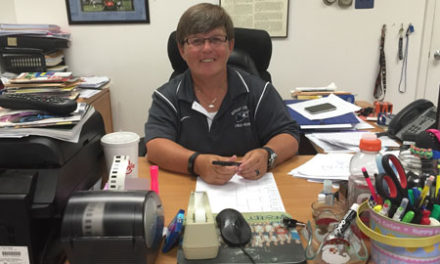By Emily Temple (Whetstone)
Emily Temple: Where are you from?
Ron Douglas: Originally I’m from Pittsburgh, or near Pittsburgh, a little place called Beaver County. But I’ve spent most of my life in the city of Pittsburgh.
ET: How long have you been teaching?
RD: Well, I was a teaching assistant where I taught my video production class and another class for two years, and then I was an adjunct for a year, and then I was a full-time assistant professor for another three years before coming to Wesley.
ET: What classes have you taught?
RD: I taught a lot of them; they’re all media-related. Video production was the main one, nonfiction video production or documentary. Immigration in film, film interpretation, and then I taught a graduate course on media and social movements. Digital photography, stop-motion animation, motion graphics, a course on Photoshop, and a general survey introduction to Art.
ET: What classes are you currently teaching at Wesley?
RD: Video Production, Documentary Films, Digital Photography, and Media Aesthetics.
ET: What rewards to you get from teaching?
RD: Whenever I can see that something that I’ve said or something that I’ve guided someone to do made some sort of difference in whether they’ve learned something, but more so whether it’s made some kind of difference in their life. I find with teaching courses on media theory that some students will see the same thing a hundred times and, when put into a different context with the analytical clues, they can actually talk about the experience and articulate how they feel about it. It’s the same thing with video production; whenever I lead someone to being able to express themselves in visual language, that’s always a reward. I’m always really interested in seeing what students make. It’s a reward to see it and think, “Yeah, that’s one of my students.†I remember I had a photography student and when she did her senior project her photos didn’t look anything like mine, but I could see in them the things she had been exploring while she studied, and that’s a good thing.
ET: Where did you go to school? What was your major?
RD: I’ve gone to a few different ones. I’m a first-generation college-goer, so I started at a community college. I’m not embarrassed to say that I had terrible SAT scores, and I probably couldn’t have made it into a lot of schools. But I could go to a community college, and I did really well there. I went to community college in Beaver County first, which was the closest college to my house and the most affordable, and I got an Associate of Applied Science in Communications. After that, my grades were good enough that I could get into a good school, and I went to the University of Pittsburgh and got a BA in Film Studies and Religious Studies. And then I went to graduate school at the University of Buffalo, the largest part of the SUNY system. I got my MFA there in Media Production.
ET: What drew you to the media field?
RD: What didn’t? When I grew up it was television, mid-nineties it was the Internet, and independent films were coming out. There’s just the fascination with motion pictures and living in an environment where there’s media everywhere, and you want to understand it. The first video I ever made was to get out of doing my French homework, and so I made a video in French rather than doing the required thing, and I shared it with my class. Everybody laughed, and I got an A on it. So maybe it’s to get out of doing other work. What also drew me to it was when camcorders and such were readily available, and I saw these things that were happening that weren’t being recorded, but I was there and I had a camcorder so I started recording.
ET: As a student, what was your worst/most interesting job?
RD: As a student? I didn’t really have any interesting jobs as a student, not anything out of the ordinary. I worked in a parking garage, I worked in a nonprofit sorting medical supplies; those were student jobs. In between different years of college I worked on riverboats, and in a couple of factories. I don’t know if I had the typical college experience, because I didn’t go straight through. My most interesting job aside from documentary work was being a cab driver, which I did for four years in Pittsburgh, between my undergraduate and graduate school.
ET: Do you have a favorite movie?
RD: I don’t have favorites, there’s a lot of things I like. I really like this film by Mathieu Kassovitz, called Hate. I really like the documentary filmmaker Hubert Sauper. There’s a film called Darwin’s Nightmare about Tanzania that I liked a lot. I like horror films, I like cartoons, so I can’t really say that I have a favorite.
ET: Favorite book, poem, or author?
RD: Again, probably none of the above. I like On the Road by Jack Kerouac, that’s a really good book, but so is The Stranger by Albert Camus. Non-fiction, I like the writings of Ella Shohat and Robert Stam a lot, but they’re not novels, they’re academic texts.
ET: Favorite music or artist?
RD: I like punk and metal, hip-hop, calypso, dark wave, Goth, all of those. Favorite artist is just too hard to say. There’s a song called ‘The List’ by Filth that I like a lot.
ET: What are some of your hobbies?
RD: My work is my hobby. I say that in sincerity; if I wasn’t doing video photography, that’s what I’d be doing in my spare time. There are other things, too. I like drawing as a hobby, cooking, and sewing.
ET: What are you passionate about in life?
RD: Life itself is a passionate experience, I suppose. Really living, I know it’s kind of a vague answer, but I feel like life itself is a series of very intense experiences that you interact with on a continual basis because you don’t have a choice in the matter, so you might as well feel about it.

